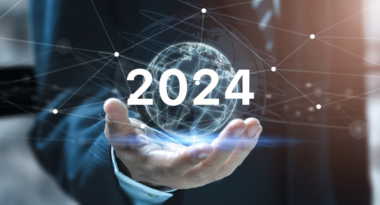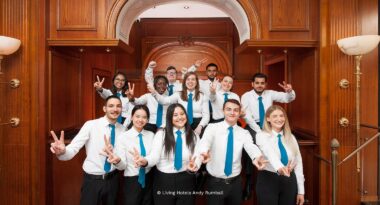Generation Z – The term refers to those born between 1996 and 2009. They don’t intend to keep working like the former generation of employees did. They have new and different values, conceptions and priorities: When it comes to work, they set their own terms. But what do these terms look like? In what ways does work in the tourism industry need to change to become more appealing to the younger workforce? In this article, we’ll take a look at the future world of work.
Generation Z and their expectations of the world of work
Building a career at all costs is now a thing of the past. Generation Z prefers a fulfilling job and the possibility of self-development and continuous further training. Added to that, they expect a fair wage and job security. They also have principles and, for example, don’t want to work for oil companies that exploit the planet at the expense of children and channel money into the bank accounts of a few Super Rich. According to recent studies, social responsibility, human rights, tolerance, justice, diversity and environmental consciousness are burning issues for the young workforce (Ernst & Young GmbH 2020, Deloitte Touche Tohmatsu Limited 2021; Albert et al. 2019). In the Randstad Work Monitor 2023 for Austria, 36 percent of those questioned indicated that they wouldn’t accept a job offer from a company that doesn’t share their values. Moreover, Generation Z is also aware of physical and mental health issues and expects their employer to take these into account (Schnetzer 2021).
You may think that this is a generation without any kind of ambition. But this is a clear misconception: According to the Shell Youth Study, diligence and ambition are important for 83 percent of the 12- to 25-year-olds, but no longer at all costs. It is also true that in the “War for Talent” companies in all sectors should pay attention to Generation Z’s expectations of the world of work.
New Work: A modern Approach for today’s world of work
The term New Work is based on a philosophical-sociological notion developed by Prof. Frithjof Bergmann. It examines the issue of what a contemporary way of working, in which the needs and satisfaction of employees are prioritized, could look like. In summary, this means: More autonomy and flexibility, scope for involvement, more trust and empathy, flat hierarchies and a fair wage. Ultimately, New Work mirrors the central demands of Generation Z and is generally a good formula to ensure satisfied employees.
Work can cripple or even kill us, but this is just one side of the coin. Work can also give us a kind of energy, that we could never have dreamt of having.
Martin Seibt and Christian Holzer, who deal with emotional intelligence in employee management and New Work in the ei-Institut (Institute for Emotionally Intelligent Leadership) in Salzburg, share the same opinion: “If people do what they really want to do, then they are highly efficient, intrinsically motivated and successful” (Seibt, Holzer). Bodo Janssen, a Hamburg-based entrepreneur, hotel chain owner and visionary of New Work, wrote the bestselling book “Die stille Revolution” (The Quiet Revolution) about the “new world of work” and takes the same line.
If the employees are happy and satisfied, then so are the guests.
New Work in the Hospitality Industry – What does it look like?
The different types of hotels: Independent hotel, franchise hotel, chain hotel, boutique hotel make it nearly impossible to find a one size fits all New Work model for the hospitality industry as each business has its own particularities. It’s about looking at the different subsections and implementing elements of New Work wherever possible. New Work is a transformation process that is concerned with modifying the work culture and it’s based on commonly defined values like transparency, cooperation and flexibility. This can lead to more satisfied staff, but also to many new ideas for shaping the future of the hospitality industry. Here are some examples of how the tourism sector can become more appealing to Generation Z employees:
Flexibility and Freedom
Generation Z’s motivation is particularly strong if they are given the opportunity to get involved. Allowing staff to participate in the design of the workplace and the shaping of daily work processes will lead to the emergence of new ideas, greater commitment and greater identification with the employer. Moreover, flexibility is a key factor for young employees, be it in the form of part-time employment schemes, family-friendly working hours or the possibility to do home office. Countless businesses are already proving that this is also possible in the hospitality industry: In the AVIVA ****s make friends hotel in Upper Austria, for example, employees have been working a four-day workweek since 2018. Managing Director Christian Grünbart would like to keep it that way:
Our employees come to work and are well-rested, more relaxed and all-round happier.
Employees in the tourism sector also shouldn’t be deprived of the possibility to work from home. While physical presence at the reception desk or in the maintenance and housekeeping departments will remain indispensable, back-office tasks can certainly be done from home, where it’s generally also easier to concentrate compared to the often hectic setting of a hotel.
Technology
Digital tools make it possible to automate routine tasks, improve internal communication and thus make more time for the hotel staff to carry out the actual tasks at hand. Added to this are the expectations of Generation Z: They grew up with digitalization and therefore also expect to benefit from the advantages of modern technology at work. In an interview with hotelkit, Patrick Apostolo, Corporate Director EMEA at Radisson Hotel Group, explains.
We live in a digital age and digital communication as well as digital tools are now part of our daily lives. So why shouldn’t we use these modern digital tools at work, not least, because the new generation of employees anticipates this. Especially in the hospitality industry, where there is a continuous personnel shortage, it’s important to create incentives and to retain employees: Let’s use this!
Collaboration and Leadership
In general, hotel companies are known for their clearly defined hierarchies. If a job title contains the word Manager, this means that the employee has authority in a department, entire hotel or hotel chain. Generation Z, however, demands flat hierarchies, a team-oriented work culture and work at eye level. The CEO of hotelkit, Marius Donhauser, views internal exchanges with employees as a central factor for entrepreneurial success: “The team’s input is essential for the project to succeed”. Furthermore, acknowledgement is also an important element for the young workforce: In a study carried out by Randstad Deutschland in 2021, 68% of those questioned indicated that “being needed” is important to them. Hotels will have to decide on an individual basis how this new type of collaboration and connectivity could look like. More and more hoteliers are also finding that the promotion of the employee’s well-being in the workplace is a key factor for employee retention. Michael Todt, Managing Director of Superbude Vienna, shares this point of view.
A workplace where employees feel comfortable is already worth a lot. If the business represents values with which the employees can identify themselves, this is already an ideal foundation for retaining employees for a longer period.
Health and Well-being
The young generation gives great importance to their own health: According to a recent study, 7 out of 8 Generation Z interviewees consider the promotion and offer of health measures an important element regarding the attractiveness of a company (Weitzel et al. 2020). Companies should pay more attention to work-life balance, be it through appropriate working time models, the design of the workplace or a new definition of work itself. Generation Z has a new understanding of work and views it as two-in-one: Living whilst working and working whilst living. Having to work increasingly gives way to wanting to work. To meet this demand, tourism businesses can take action in a wide variety of areas. Day-to-day work in the hotel is hectic, which is why there should be a relaxation room available for the staff. For this purpose, there are innovative room concepts that include rest and meeting zones for employees. The provision of free psychological support and sports activities can be further important steps in promoting the well-being of staff. Generation Z also attaches great importance to the possibility of continuous further training. In a study conducted by the Zukunftsinstitut in 2013, 85 percent of the 20- to 35-year-olds said that continuously extending their knowledge is one of their lifelong goals.
Conclusion: A New Work Hotel is possible
In the book “Factful”, the health scientist Hans Rosling explains that convictions often stem from what we learnt in our childhood or youth. The same applies to our expectations of work, that it’s only a means to earn money and not meaningful. Meanwhile, more and more businesses are finding out about the New Work model, implementing it and proving that a different way of working is actually feasible. In turn, these companies are benefiting from highly motivated and healthy employees, low turnover and higher productivity. Generation Z expects this kind of work environment and culture from their employer. Ultimately, hotel managers should not ask themselves whether they should implement appealing benefits for employees, but how they can put them into practice.
Digitalize the work processes in your business!

About the author
Michael Santner
Narratives about impoverished poets during his studies encouraged him to follow his passion in a secure job. In hotelkits marketing he takes care of packing the numerous ideas of his colleagues into exciting stories.
Sources:
Ernst & Young (2020) EY Studierendenstudie 2020, StudentInnen in Deutschland: Werte, Ziele, Perspektiven. Ernst & Young GmbH Wirtschafsprüfungsgesellschaft
Deloitte Touche Tohmatsu Limited (2021) Millennial and Gen Z Survey. A call for accountability and action | Germany
Albert M, Hurrelmann K, Quenzel G, Schneekloth U (2019) Die 18. Shell Jugendstudie — Eine Generation meldet sich zu Wort. Diskurs Kindheits- und Jugendforschung / Discourse. Journal of Childhood and Adolescence Research 14(4): 484-490
Ali Sunyaev, Christoph Rosenkranz, Phil Hennel, Richard Guse, Scott Thiebes, Tamina Seeger-Nukpezah: Digitalisierung – Auswirkungen auf die Arbeitswelt von Morgen
Randstad Workmonitor 2023 – Österreich. https://workforceinsights.randstad.com/workmonitor-2023
Martin Seibt, Christian Holzer: Glückliche Menschen haben Erfolg. Führungskultur im digitalen New Work, bookboon Verlag
Bergmann, Frithjof: Neue Arbeit, Neue Kultur. Arbor Verlag (2017)
Weitzel T, Maier C, Weinert C, Pflügner, Oehlhorn C, Wirth J (2020) Generation Z — Die Arbeitnehmer von morgen — Ausgewählte Ergebnisse der Recruiting Trends 2020, Research Report. Bamberg: Otto-Friedrich-Universität





